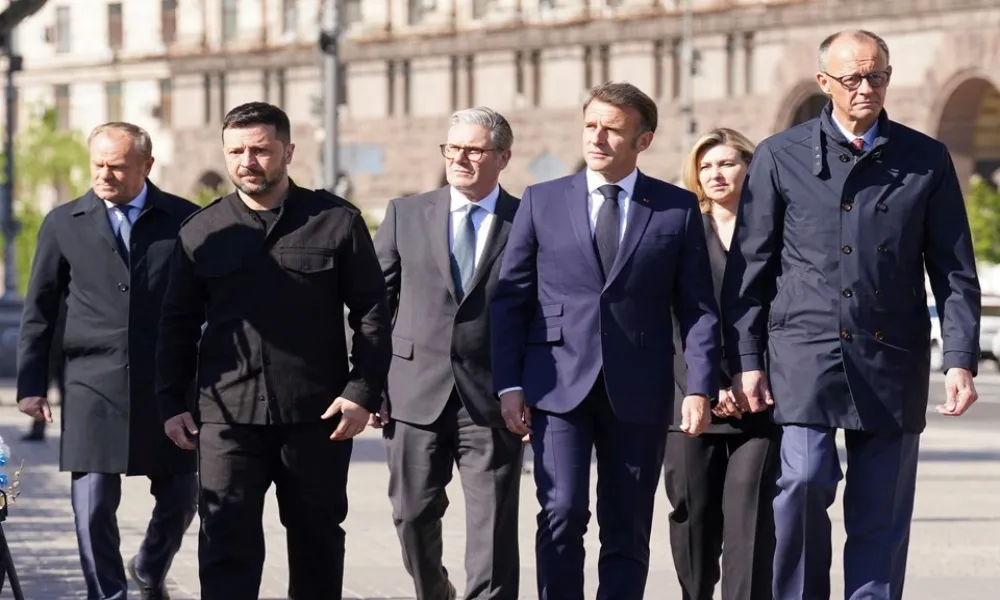Cyprus is expected to be among the 26 states that endorsed the initial framework for security guarantees to Ukraine, agreed during a 'Coalition of the Willing' meeting in Paris on Thursday. The gathering, convened by French President Emmanuel Macron and attended by Ukrainian President Volodymyr Zelensky, focused on ways to bolster Kyiv’s long-term security.
Macron announced that 26 countries had signed on to the framework, though he stopped short of naming them. He clarified that not all participating states would commit to deploying troops in Ukraine. Instead, the guarantees would also cover indirect support, such as training Ukrainian forces and other non-combat measures.
Cyprus’ President, Nikos Christodoulides, also joined the Paris meeting by teleconference, where two key questions arose: Is Cyprus among the 26 countries, and what role might Nicosia play in Ukraine’s security guarantees? For now, the government has not commented on Macron’s announcement.
Cyprus had made clear from the outset that it could not contribute troops, citing the limited capacity of its National Guard and the continuing presence of Turkish occupation forces in the north. But officials point out that support could take other forms, such as training in demining, contributing to investigations into missing persons of war, or carrying out administrative duties in international missions.
Demining
Cyprus has already taken part in the EU’s Monitoring Mission to train Ukrainian troops, approved by EU foreign ministers in late 2022. Since then, around five or six groups of Ukrainian soldiers have travelled to the island for specialist training in demining.
The Republic has long-standing expertise in this field, gained in the aftermath of the Turkish invasion, and is now seen as well-placed to assist Ukraine in tackling the enormous challenge of clearing landmines, a process expected to take many years given the vast scale of its territory.
Missing Persons
Another area where Cyprus could play a meaningful role is in dealing with missing persons. Every conflict leaves behind lists of the disappeared, and in Ukraine the number is estimated to be in the many thousands. Once the war ends, large-scale investigations will be needed to trace them.
Cyprus has decades of experience in this field, rooted in the aftermath of the Turkish invasion, and could share its expertise by training Ukrainian investigators or even taking part directly in search efforts. Few European states can match the practical knowledge Cyprus has built up over the years.
Humanitarian Aid
In recent years, Cyprus has also built-up good practices in delivering humanitarian assistance to populations fleeing war zones, an area where it could make a meaningful contribution in the postwar period. The island has already acted as a humanitarian corridor and safe hub during conflicts in Sudan and later in Gaza, gaining valuable experience in civilian evacuations and the coordination of aid deliveries.
This expertise could now be channeled into Ukraine, with Cyprus playing a role in planning potential evacuations and providing medical and humanitarian support in the event of renewed clashes with Russia.
International Missions
Cyprus has also taken part in several UN and EU international missions, contributing police officers and other officials in places such as Lebanon and Georgia. It even held an administrative role in 'Operation Atalanta', the EU’s naval mission against piracy in the Indian Ocean and off Somalia’s coast.
Against this backdrop, participation in an international mission to Ukraine under the framework of security guarantees cannot be ruled out, though it would almost certainly be limited to administrative or policing duties rather than combat operations.
Geopolitical Footprint
A government source told Politis that the Republic of Cyprus is keen to play a part in shaping postwar security guarantees for Ukraine. Nicosia backs Kyiv politically and, as a state itself scarred by invasion and occupation, stresses that international law must be upheld.
A Foreign Ministry official added that countries such as Cyprus, facing unresolved occupation issues of their own, need to be present in international initiatives such as the 'Coalition of the Willing', both to show solidarity and to broaden their geopolitical footprint.
Security Guarantees
Discussions on security guarantees remain at an early stage, and the specific role of each member of the 'Coalition of the Willing' has yet to be defined. In any case, such guarantees would only carry weight if a peace agreement were reached between Ukraine and Russia.
Russian President Vladimir Putin said on Thursday that he saw no reason for Western forces to be stationed in Ukraine after the war. He warned that any deployment of foreign troops before the end of hostilities would be treated as a “legitimate target” for the Russian military. By contrast, Ukrainian President Volodymyr Zelensky insisted his country expects thousands of foreign troops to form part of the postwar security framework.
A military source told Politis that Ukraine would need a postwar security force of around 200,000 troops, supported by tanks, armoured vehicles, fighter aircraft and other assets, to cover the roughly 1,000-kilometre border with Russia and deter any future attack. The source questioned whether European countries alone could provide such capacity, noting that Europe lacks a fully organised army, and stressed that participation by the United States and Canada would be essential for the guarantees to become a realistic scenario.
